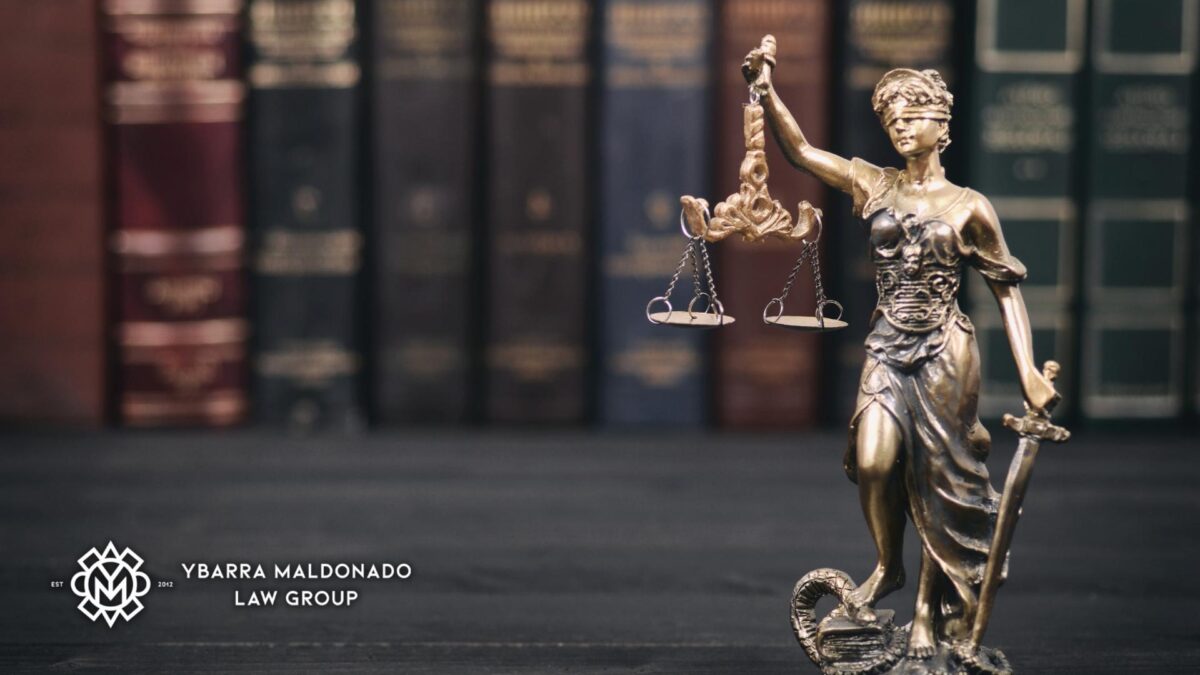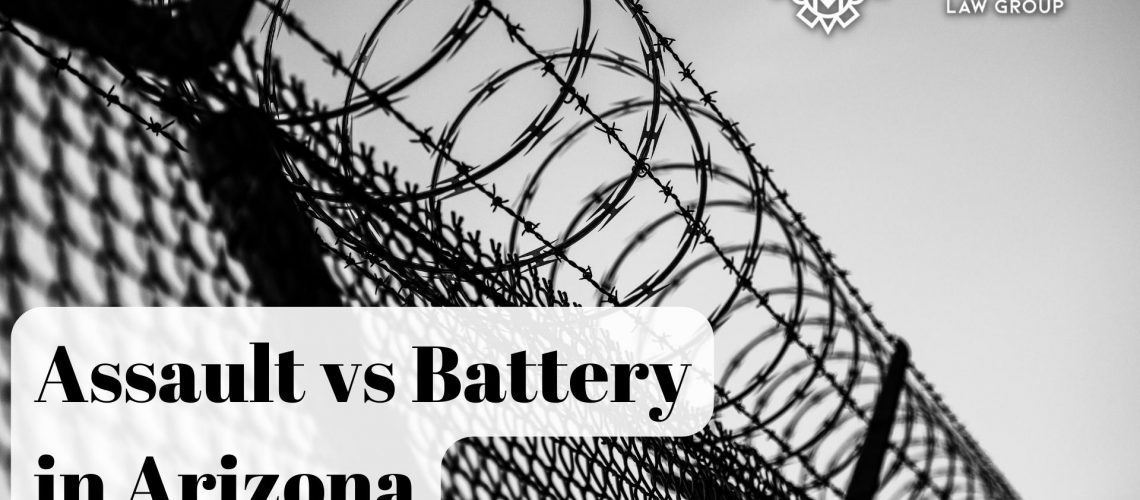Assault and battery in Arizona are often used together to define a crime where physical threats and contact were committed. However, one of the most popular questions asked in criminal law is, are they the same or different crimes? While both assault and battery have many similarities, there are some differences between the criminal offenses that set them apart. In this blog, we explain the differences between assault vs battery.
One of the biggest differences between assault and battery is how they’re punished in the Arizona legal system. The Phoenix criminal defense attorneys from the Ybarra Maldonado Law Group will explain how these crimes are different and why it’s critical you hire one of our attorneys when charged with this offense.
To schedule a free initial consultation with one of our criminal defense attorneys, call the Ybarra Maldonado Law Group at (602) 910-4040 today.
Assault vs. Battery in Phoenix, Arizona
While both assault and battery sound like serious crimes, one is less severe than the other. To be charged with assault, actual physical contact does not necessarily have to occur. An assault can happen when one person makes a physical threat against another.
On the other hand, battery occurs when there is physical contact or force present during the assault. If a deadly weapon is present during the assault, it can be increased to an aggravated assault charge, even if there was no physical contact.
Since a person commits assault when they threaten harm to another, and battery is the physical act of harming another, these offenses are often charged together.
Arizona Assault and Battery Laws

Even though assault and battery are often charged together, the laws in Arizona differentiate the two criminal offenses.
ARS 13-1203: Attempting to Cause or Causing Bodily Harm
ARS 13-1203 is the Arizona law that outlines the behaviors and actions considered assault. A person can be arrested for assault if they perform one of the following actions:
- Intentionally or recklessly cause physical harm to another
- Intentionally causes fear of bodily injury to another
- Knowingly touches another with the intent to injure or provoke them
Assault Charges in Phoenix, AZ
According to Arizona law, an assault charge will result in a misdemeanor, regardless of the severity. To be convicted of this crime, the prosecution must show beyond a reasonable doubt that the accused:
- Knowingly, recklessly, or intentionally caused physical injury to another
- Intentionally caused another person to fear that they were in danger of bodily harm
- Knowingly touched another with intent to insult, provoke, or injure that individual
To successfully convict someone of an assault charge, the prosecution must prove that one of the three situations occurred. Since Arizona harshly prosecutes those accused of assault, they will most likely be convicted of committing assault.
Classes for Assault Charges
Arizona divides the different types of assault charges into classes based on the severity of the offense. The various simple assault classes in Arizona are listed below.
- Class 3 Assault: This assault charge is the lowest criminal charge a person can face when accused of assault. When proving this offense, the prosecution only needs to show that you had physical contact with another person intending to injure, insult, or provoke. The alleged victim of this incident does not have to have injuries.
- Class 2 Assault: To prove this category of assault, there must be evidence that the other person feared imminent harm.
- Class 1 Assault: This criminal charge is the most serious and requires evidence that you knowingly, intentionally, or recklessly caused another person physical injury.
ARS 13-1204: Causing Serious Bodily Injury
ARS 13-1204 considers any type of assault that involves a deadly weapon or causing great bodily harm to be aggravated assault or battery. A battery assault conviction typically results in a Class 2 felony.
For assault to be considered aggravated assault or battery, one of the following must occur:
- The offense resulted in serious bodily injury.
- The accused used a deadly weapon or dangerous instrument.
- Accused used such force that resulted in the substantial disfigurement of the individual or caused significant loss or impairment to the body.
- The accused committed the crime after entering a person’s private residence.
- The assault was committed against a person under 15
Other factors can lead to a simple assault charge being upgraded to aggravated assault or battery. If the assault was committed against one of the following, it can become an aggravated assault.
- Firefighter
- A police officer or law enforcement official
- Teacher or school employee
- Health care provider or practitioner
- Public defender or prosecutor during the time they were engaged in official duties
- Park ranger
Aggravated Assault (Battery) Charges in Phoenix, AZ
Aggravated battery, commonly called aggravated assault in Arizona, is a serious criminal offense. If convicted, a person can face felony charges ranging from Class 2 to Class 5. Due to the severity of the crime, a person can face prison time even if it’s their first offense.
What Is Considered Harmful or Offensive Contact?
When used in the context of assault and battery, harmful or offensive contact is touching that is likely to or is capable of causing harm or offending a reasonable person. This form of physical contact goes against the social standards of what is acceptable.
Classes for Battery Charges
A battery charge will almost always result in a felony conviction in Arizona, but the circumstances surrounding the crime can increase the punishment based on the aggravating circumstances. Some examples of different battery charges in Arizona are:
- Aggravated Assault With a Deadly Weapon: Considered a Class 3 dangerous felony and can also include aggravated assault with a dangerous instrument.
- Aggravated Assault Based on the Status of the Victim: This aggravated battery charge is considered a Class 6 felony.
- Aggravated Assault on a Victim Under 15: This offense is usually considered a Class 2 felony. However, since this crime is regarded as a dangerous crime against a child, the penalties can be much more severe.
Potential Penalties for Assault and Battery

The penalties one could face when charged with assault or battery can vary based on the severity of the offense and other circumstances. If the offender has any prior convictions, they could face longer prison time and heftier fines. Minor assault and battery offenses are typically considered misdemeanor crimes, while more serious charges can result in felony convictions.
What Are the Penalties for Assault in Arizona?
Assault charges in Arizona are considered misdemeanor offenses with short jail sentences and lower penalties than the more serious offense of battery. The penalties for assault charges in Arizona are listed below.
- Class 3 Misdemeanor (Assault): This conviction can result in 30 days in jail and up to $500 in fines.
- Class 2 Misdemeanor (Assault): This misdemeanor offense can result in a four-month jail sentence with up to $750 in fines.
- Class 1 Misdemeanor (Assault): The simple assault charge is the most severe and is punishable by a maximum six-month jail sentence and up to $2,500 in fines.
What Are the Penalties for Battery in Arizona?
Even if the offender has no prior convictions, they will most likely be charged with a felony if found guilty of battery or aggravated assault. The penalties for aggravated battery or assault listed below are for first-time offenders. If the accused individual has a criminal record and prior convictions, the penalties they could be charged with will most likely increase.
- Class 5 Felony: If convicted, the offender could face up to four years in prison.
- Class 4 Felony: A person could serve up to eight years in prison if convicted.
- Class 3 Felony: A maximum prison sentence of 15 years if convicted.
- Class 2 Felony: A maximum prison sentence of 21 years.
Those convicted of felony aggravated assault can also be required to pay up to $150,000 in fines.
What Are Legal Defenses for Assault and Battery Charges?

If you face assault and battery charges, it’s not time to throw in the towel. A strong legal defense can mean the difference between serving probation or jail time. The Phoenix criminal defense attorneys at the Ybarra Maldonado Law Group have represented numerous clients against criminal charges, including assault and battery.
Depending on the circumstances surrounding your case, your attorney may use one of the following legal strategies to defend you against the charges:
- Self-Defense
- Lack of intent
- Rights were violated during the arrest
- The force was used to protect others
- No proof beyond a reasonable doubt
Do I Need an Attorney for Assault and Battery Charges in Phoenix?
An assault or battery charge is a serious criminal offense and should not be taken lightly. Whether the crime is simple assault or aggravated battery, hiring an experienced criminal defense attorney is in your best interest. Not only can your attorney help you navigate your criminal charges, but they can also increase your chances of having your charges lowered, dismissed, or dropped.
Contact a Phoenix Criminal Defense Lawyer at Ybarra Maldonado Law Group

Assault and battery charges can be detrimental to anyone, regardless of their criminal record. While misdemeanor charges carry less weight than felony charges, hiring an experienced criminal defense attorney is still just as important.
The Phoenix criminal defense attorneys at the Ybarra Maldonado Law Group have represented Arizona clients against misdemeanor and felony charges. To schedule a free consultation with one of our attorneys, call our law firm today at (602) 910-4040.


